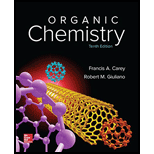
Interpretation:
The suitable sequence for each of the given synthetic transformations is to be suggested.
Concept introduction:
The electron withdrawing groups deactivates the
The electron donating groups activate the aromatic ring and give substitution at ortho-para position. Para substitution is preferred in case of steric hindrance.
The alkyl benzene on reaction with strong oxidizing agent potassium permanganate gives benzoic acid.
In Clemmensen reduction, the carbonyl group (
In the presence of Lewis acid and an
The Friedel–Crafts acylation is the substitution of acyl group (carbonyl group) to the aromatic ring with an acyl halide in presence of Lewis acid.
The nitration of arenes carried out by using fuming nitric acid in the presence of concentrated sulfuric acid.
Want to see the full answer?
Check out a sample textbook solution
Chapter 13 Solutions
Organic Chemistry - Standalone book
- Suggest reasonable reagents that could be used to carry out the following transformations:arrow_forwardGive mechanistic explanations for the following synthetic transformations.arrow_forwardProvide the reagents necessary for the following synthetic transformations. More than one step may be requiredarrow_forward
 Organic ChemistryChemistryISBN:9781305580350Author:William H. Brown, Brent L. Iverson, Eric Anslyn, Christopher S. FootePublisher:Cengage Learning
Organic ChemistryChemistryISBN:9781305580350Author:William H. Brown, Brent L. Iverson, Eric Anslyn, Christopher S. FootePublisher:Cengage Learning
